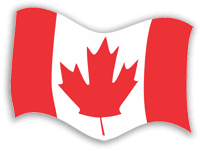|
Pierre Trudeau, a Quebecer, went into politics to fight Quebec
separatism. As Liberal prime minister from 1968–1979 and
1980–1984 he kept Canada together and also changed the country
forever. Trudeau was the father of a new constitution for Canada
that included a Charter of Rights and Freedoms and guarantees of
multiculturalism. And his government made Canada officially
bilingual.
Unlike prime ministers who believed in politics as a way of
finding compromises, Trudeau felt that he had to confront and
defeat his enemies. He would not compromise his principles. His
governments made many mistakes and Trudeau was often deeply
unpopular, but most Canadians respected him for his convictions
and ability.
Trudeau had a French-Canadian father and a Scots-Canadian
mother. The Trudeaus were wealthy, and young Pierre, born in
1919, was educated at the best universities in three countries
before settling in Montreal as a lawyer and political
commentator. In the early 1960s he decided that the growing
separatist movement in Quebec was a rejection of Canada and the
modern world that would be disastrous for French Canadians. He
ran for Parliament in 1965 to help Lester Pearson’s Liberal
government resist demands from the province of Quebec. Three
years later he won the race to succeed Pearson and became prime
minister.
Trudeau was a smart, handsome intellectual who liked beautiful
women and fast cars. He was a Roman Catholic but as minister of
justice in the Pearson government he sponsored the legalization
of birth control, homosexuality, abortion, and easier divorce.
He became an idol of many idealistic and young Canadians in the
1960s, sparking an outpouring of affection known as
Trudeaumania. The 1968 election was an easy victory for Canada’s
celebrity prime minister.
Trudeau believed that the homeland of French Canadians was not
just Quebec, but all of Canada and that they should be able to
use the French language all across the country. This was the
foundation of the policy of official bilingualism. Trudeau also
believed that the government of Canada should not support the
culture of any one ethnic group but instead that Canada should
be officially multicultural. By the Trudeau years Canada was
accepting immigrants of many races and religions, many of whom
were pleased that Canada welcomed cultural diversity.
In October 1970 political kidnappings by separatist terrorists
in Quebec caused the Trudeau government to send armed soldiers
into the province and suspend civil liberties. Most Canadians
applauded Trudeau’s tough stand. However. six years later Quebec
elected its first separatist government, René Lévesque’s Parti
Québécois. In 1980 it held the first referendum on its plan to
make Quebec a separate and equal partner with Canada. In leading
the “Non” forces in that referendum, Trudeau promised that he
would introduce constitutional change to protect the rights of
all Canadians.
After a bitter struggle with most of the provincial governments,
especially Quebec’s, in 1981 the Trudeau government was able to
patriate the Canadian constitution from Canada’s former mother
country, Great Britain. Except for the symbolic monarchy,
Britain would no longer have any power in Canadian affairs. A
new Charter of Rights and Freedoms defined Canadians’
fundamental rights, including the collective right of
multiculturalism.
Trudeau considered constitutional change his greatest
achievement. After he left office in 1984 he twice came out of
retirement to help defeat the Brian Mulroney government’s
attempts to give more constitutional powers to Quebec and the
other provinces.
Trudeau’s governments had to wrestle with other difficult
national issues as a result of the energy crisis of the 1970s
and the rising costs of health care and other social programs.
The federal government began running large budgetary deficits.
It deeply angered western Canada with its National Energy
Program to try to take control of oil and gas revenue from the
producing provinces. Trudeau was widely disliked in some circles
as an arrogant, spendthrift prime minister. His government’s
foreign policy, including support for underdeveloped countries
and attempts to ease the Cold War, also had limited success. His
party lost the 1979 election, and his career seemed to have
ended until he seized his second chance when Conservative Prime
Minister Joe Clark failed to make a minority government work.
Canadians and others were fascinated by Trudeau’s lifestyle. He
had a glamorous wife, Margaret, three handsome sons, a
well-publicized marriage break-up, and affairs with beautiful
women. He had a habit of treating his enemies, and the media,
with contempt. Polls showed that Trudeau was both the most
admired and most disliked prime minister of our times. Still,
when he died in 2000 there was a massive outpouring of respect
and affection among Canadians. Even his opponents agreed that he
had been one of
Canada’s most influential prime ministers.
Further Reading: Right Honourable Men: The Descent of Canadian
Politics from Macdonald to Chretien, by Michael Bliss; The Life
of Pierre Elliott Trudeau: (vol 1) Citizen of the World; (vol
1I) Just Watch Me, by John English.
Next Instalment: The Success Story of Brian Mulroney
The Canadian Experience is a 52-week
history series designed to tell the story of our country to all
Canadians. Sponsored by Multimedia Nova Corporation and
Diversity Media Services partners, the series features articles
by our country’s foremost historians on a wide range of topics.
Past articles and author bios are available at
http://www.cdnexperience.ca. The Canadian
Experience is copyright ©2010-2011 Multimedia Nova
Corporation.
|
|
 #21 Pierre Elliott Trudeau: Canada’s Fighting Prime Minister
#21 Pierre Elliott Trudeau: Canada’s Fighting Prime Minister
